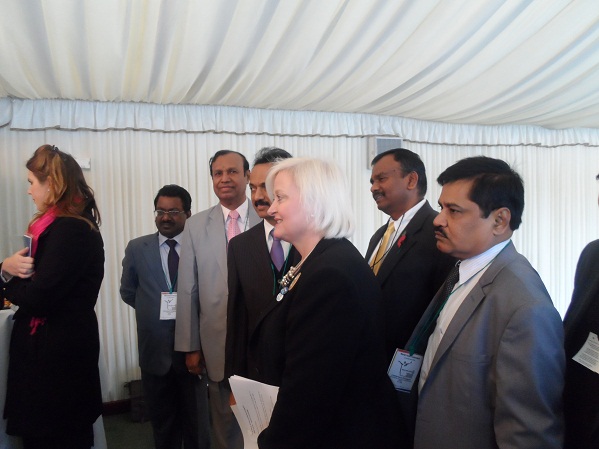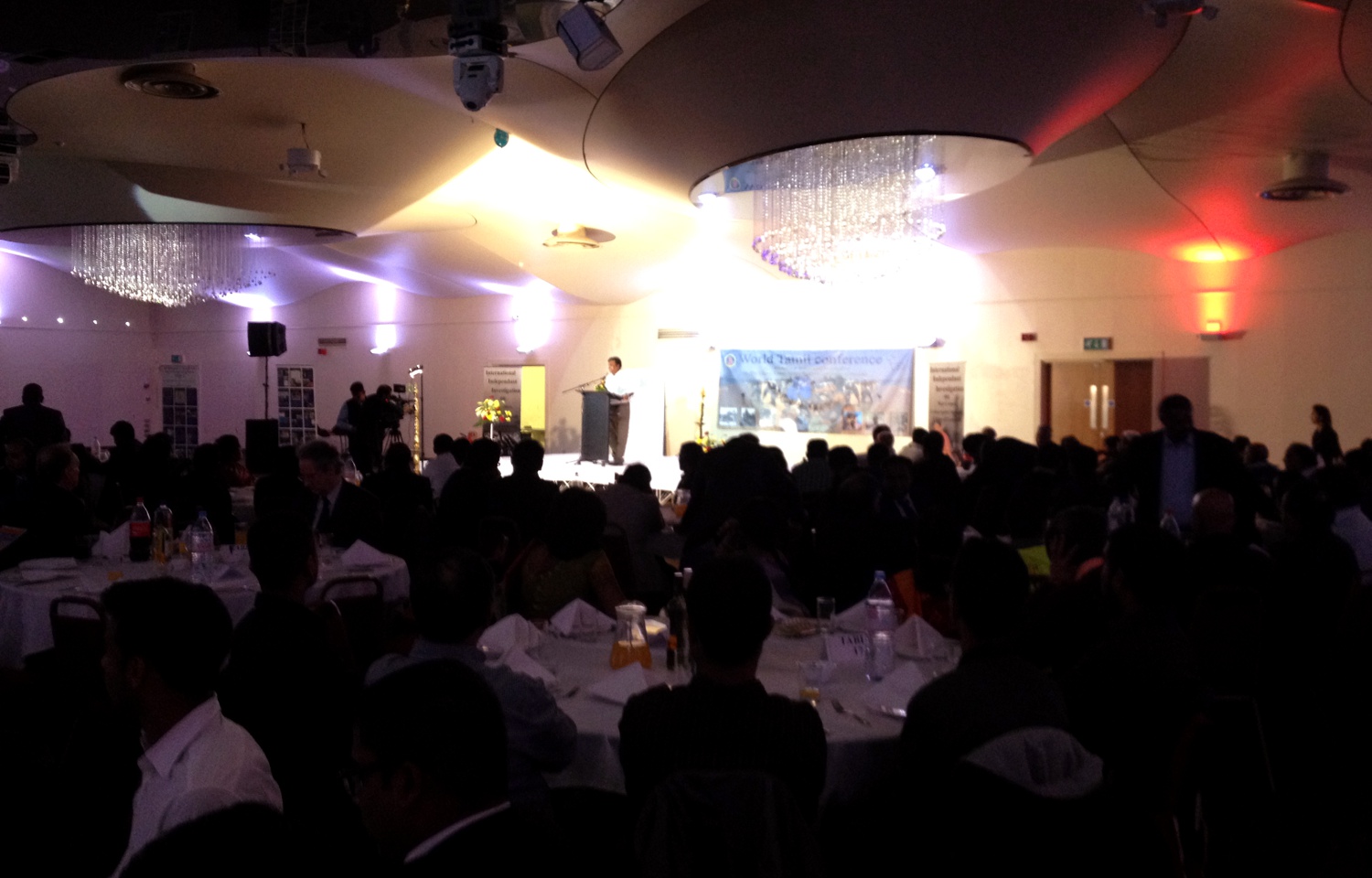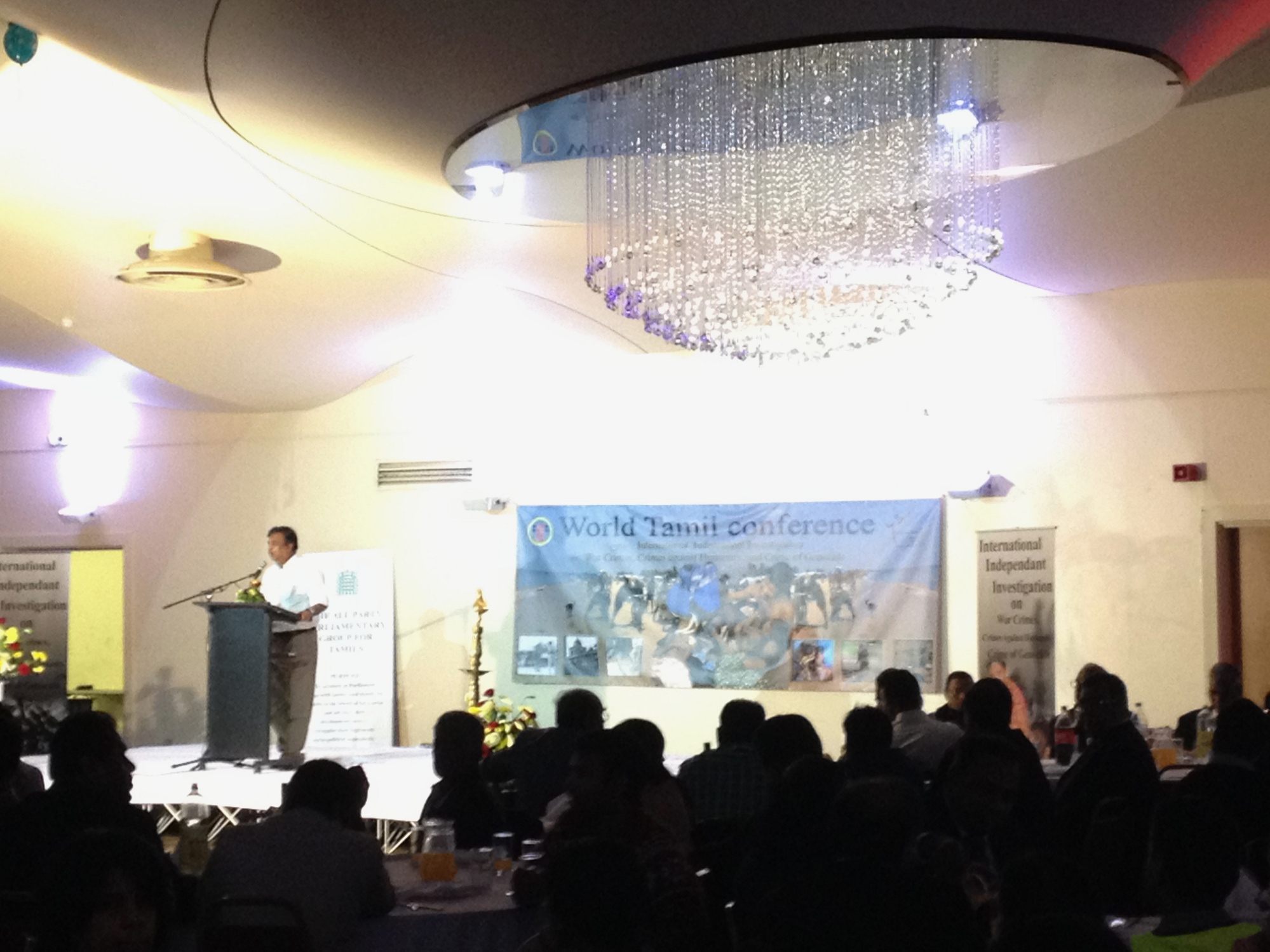 |
|
TNPF leader Gajendrakumar Ponnambalam addresses World Tamil Conference |
Gathering at the 2012 World Tamil Conference, Tamil activists and politicians from the North-East and the diaspora, together with British parliamentarians and Tamil Nadu politicians and civil society activists, made a united call for an international, independent investigation into the allegations war crimes, crimes against humanity and crimes of genocide by the Sri Lankan state against the Tamil nation.
The event, organised by the All Party Parliamentary Group for Tamils (APPGT) and British Tamils Forum (BTF), was held on Wednesday, inside the British Houses of Parliament in Westminster, London.
Follow us on Twitter @TamilGuardian to see our live coverage of today's event.
 |
In a proposed resolution delegates from Tamil political parties and organisations worldwide urged:
1) Take immediate steps to provide for space for free flow of information that would bring to light as to the ground realities prevailing in the North and East of the Island of Sri Lanka.
2) To stop decimation of the Tamil Nation by the Sri Lankan State.
3) To stop Sinhalisation of the Tamil traditional Homeland.
4) To demilitarise the Tamil People’s Homeland for the people to exercise their democratic rights free from fear of persecution.
See here for full text of proposed resolution.
Addressing the event, the leader of the Tamil National People's Front (TNPF), Gajendrakumar Ponnambalam, asserted that the genocide of Tamils was nothing short of "a systematic dismantelling of the existence of the Tamils as a nation in the island of Sri Lanka", and though the international community may hestitate in recognising it to be so, the Tamil nation must never hesitate in articulating it.
"If you've seen the recent dialogue that's been taking place internationally, that dialogue has been very specific. The international community has only been interested in talking about war crimes that have been taking place, only in the last stages of the war, that is from January 2009 to May 2009."
"Whilst those crimes were being committed, and whilst we as former members of parliament, and members of parliament at that time, engaged with the international community, we were given two assurances. One was that if there was a blood bath, the Tamils were given assurances that there would be very serious consequences for the Sri Lankan state. The second assurance that was given, was that the LTTE - in the eyes of the international community being a terrorist organisation - once that organisation is taken out of the picture, the Tamil people's struggle for their rights will be recognised and that there would be peace."
"I think both these assurances today, have to be called into question. Firstly what we know is that purely focusing on war crimes is actually really counter productive. Three years after the war finished where there is no war, so obviously there is no war crimes, crimes are still being committed against the Tamil people."
"Today [Tamils in the Vanni] are in fact telling us that they rather.. they feel that they rather should have died in Mullivaikkal, than live the life they are living today. Such are the crimes that are being perpetrated against those people today. So talking about war crimes, is actually, immaterial in today's context. Whilst we must certainly address the most heinous crimes that took place during the war, if we don't widen our ambit, we will be failing by those people today, who are still being massacred, who are being destroyed, their livelihoods are being destroyed, their very existence is being called into question."
"We must also understand what that genocide is. It is not a genocide against a religious group, it is not a genocide against some other ordinary group, it is a genocide in that it is a systematic dismantelling of the existence of the Tamils as a nation in the island of Sri Lanka. It is nothing else. Though the international community might not want to accept it as a genocide firstly, secondly, the international community will hesitate in recognising that we are a nation in our own right, but that does not mean that we should not say what is actually happening."
Speaking to the Tamil Guardian on the sidelines of the conference, TNA MP Suresh Premachandran said:
"There are two matters. One there is no democratic space in the North-East specifically in the North. People can't express their own views. We are totally under army occupation, and the military intelligence in every nook and corner of that area. So definitely the people do not have the freedom to say whatever they want. So that is number one."
"Number two is the political settlement, that in Sri Lanka when we say political settlement they normally mean talks about talks, or they are interpreting as devolution or power sharing. Here the president and his siblings - very clearly they said - we are against the 13th Amendment (that is where the powers were devolved through that part of the constitution)... The President said, I'm not going to give the land powers or the police powers... Now, Gotabhaya Rajapaksa the defence secretary says, we have to abolish the 13th Amendment, so which clearly shows the government's attitude."
"So definitely, yeah I don't think there is any chance for a proper dialogue with the government because the government is simply against the power sharing method. So on that basis, what's the point in talking.. what's the point in with the government unless otherwise the government comes forward with a proper – how do say – proposal, for a proper settlement, which we can't expect from the Sri Lankan government."
"So I think this is the time for the international community to understand these things and come forward, maybe to investigate the whole thing, that is the war crimes, and the genocide, and the crimes against humanity and all these things. Then only, there might be a chance for reconciliation, as well as for a political settlement. So I think simply that is the situation in Sri Lanka."
The call for an international, investigation into allegations of crimes of genocide was endorsed by the Tamil Nadu politicians present:
M.K. Stalin of the DMK, Thirumavalavan of the VCK, G.K Mani of the PMK and D. Raja of the CPI.
 |
|
Photograph Tamilwin |
See TamilNet for photographs and details of Tamil Nadu delegates.
The event was also addressed by Tamil Nadu civil society activists including Thirumurugan Gandhi of the May 17 Movement.
The host, and chair of the APPG-T, Conservative MP, Lee Scott, reiterated the need for true justice when speaking, and was accompanied by British parliamentarians from all three main political parties including Robert Halfon, Simon Hughes, Gavin Barwell, Siobhain McDonagh and Gareth Thomas.
 |
In the evening, as delegates attended a chandelier shrouded gala dinner, TNA MPs Sreetharan and Appathurai Vinayagamoorthy addressed the conference, highlighting the overwhelming militarisation of the North-East. Speaking in Tamil, Sreetharan described how the military is every where you look, with over 30,000 military personnel for just 6000 civilians in the Kilinochchi district.
 |
During the dinner, Tamil Nadu civil society activists from groups such as Pasumai Thayagam, and the Sinhalese academic Jude Lal Fernando also spoke, and stressed that the persecution of the Tamil nation is nothing short of a genocide.
The conference is due to continue on Thursday.
